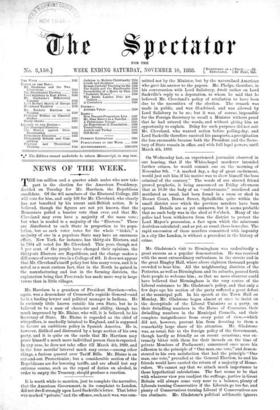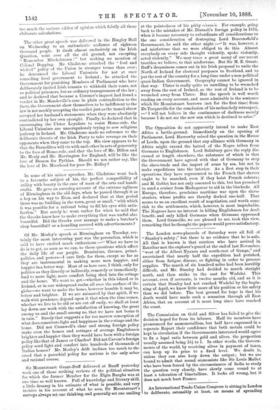Mr. Gladstone's visit to Birmingham was undoubtedly a great success
as a popular demonstration. He was received with the most extraordinary enthusiasm in the streets and in the great Bingley Rail, where above eighteen thousand people crowded to hear him. All the neighbouring districts of the Potteries, as well as Birmingham and its suburbs, poured forth their people to welcome him ; so that no mere observer could have believed that Birmingham is the very centre of the Liberal resistance to Mr. Gladstone's policy, and that only a few days ago his section of the party suffered a great defeat at the municipal poll. In his speech at the Town Hall on Monday, Mr. Gladstone began almost at once to insist on the decrepitude of the Liberal Unionists as a party, on their dwindling numbers in the House of Commons, their dwindling numbers in the Municipal Councils, and their complete insignificance from every point of view,—which did not, however, prevent him from devoting to them a remarkably, large share of his attention. Mr. Gladstone was, as usual, fair to the foreign policy of the Government, though hardly so friendly as on recent occasions; was ex- tremely bitter with them for their inroads on the time of private Members of Parliament; announced once more his adhesion to the principle of "One man, one vote," and demon- strated to his own satisfaction that had the principle "One man, one vote," prevailed at the General Election, he and his friends would have carried the return of a majority of Home- rulers. We cannot say that we attach much importance to these hypothetical calculations. The fact seems to be that with whatever view you readjust the suffrage, parties in Great Britain will always come very near to a balance, plenty of Liberals turning Conservative if the Liberals go too far, and plenty of Conservatives turning Liberal if Conservatives are too obstinate. Mr. Gladstone's political arithmetic ignores
too much the various eddies of opinion which falsify all these elaborate calculations.







































 Previous page
Previous page